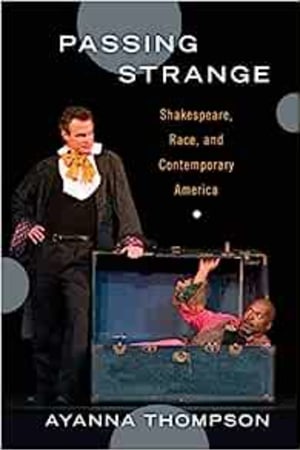Performing Arts
- Publisher : Oxford University Press; Reprint edition
- Published : 15 Apr 2013
- Pages : 224
- ISBN-10 : 0199987963
- ISBN-13 : 9780199987962
- Language : English
Passing Strange: Shakespeare, Race, and Contemporary America
Notions, constructions, and performances of race continue to define the contemporary American experience, including our conceptions, performances, and employments of Shakespeare. Passing Strange examines the contact zones between American constructions of Shakespeare and American constructions of race by asking: How is Shakespeare's universalism constructed within explicit discussions and debates about racial identity? Of what benefit is the promotion of Shakespeare and Shakespearean programs to incarcerated and/or at-risk persons of color? Are they aesthetic, moral, or linguistic? Do Shakespeare's plays need to be edited, appropriated, revised, updated, or rewritten to affirm racial equality and relevance? Do the answers to these questions impact our understanding of authorship, authority, and authenticity? A book that does not shy away from controversial topics or unconventional approaches, Passing Strange examines a wide range of contemporary texts and performances, including
contemporary films, novels, theatrical productions, YouTube videos, and arts education programs. In addition, Passing Strange is written for a broad readership, including Shakespeare scholars, secondary school teachers, theatre practitioners, racial activists, and arts education organizers. Uniquely, this book challenges its readers to see American constructions of race and Shakespeare in glorious Technicolor.
contemporary films, novels, theatrical productions, YouTube videos, and arts education programs. In addition, Passing Strange is written for a broad readership, including Shakespeare scholars, secondary school teachers, theatre practitioners, racial activists, and arts education organizers. Uniquely, this book challenges its readers to see American constructions of race and Shakespeare in glorious Technicolor.
Editorial Reviews
"A readable, argumentative discussion of race in a variety of works." --Studies in English Literature 1500-1900
"Ayanna Thompson's exciting new book forges a much needed bridge between Shakespeare studies and the study of race. In addition to analyzing deftly contemporary productions of Shakespeare, Passing Strange steps outside of convention and insightfully considers contemporary films and other performances that merely reference the Bard. In so doing Thompson boldly interrogates how race politics can inform our understanding of Shakespeare as well as how Shakespeare can impact our understanding of race. This is an important new work for scholars, students, and practitioners alike." --Harry J. Elam Jr., Editor of African American Performance and Theater History
"This terrific book marks an important step forward in Shakespeare scholarship. With skill and passion, Ayanna Thompson argues that the discussion of Shakespeare and race needs to move beyond the venerable Shakespeare-plus-theme model. By staging the relationship between contemporary race studies and Shakespeare in the American present as a spirited dialogue between true equals, Passing Strange demonstrates how fully matters of race matter in the ways we teach, perform, use, and watch Shakespeare." --Douglas Lanier, author of Shakespeare and Popular Culture
"Shakespeare never fails to ignite our idealism while remaining the great poet of compromise, disappointment, and failed hopes. This book is a report on Shakespeare at the coalface of contemporary America. Carefully observing with clarity and compassion the way Americans see themselves in Shakespeare's mirror, Ayanna Thompson subtly unravels hypocrisies, confusions and complications across a range of noble and ignoble motives that are by turns illuminating, chastening, and sometimes hard-to-watch. Its radical inclusivity and clear-headedness make Passing Strange a cause for hope, and a model for artistic and social redemption." --Peter Sellars, theater director
"Ambitious...Recommended." --Choice
"Represents a profound shift in the field...Likely to remain relevant for a long time precisely because of [Thompson's] interest in methodology and ethics. I suspect that this book will gain a wide audience of scholars and educators, directors, actors, students, or anyone interested in the relationships among Shakespeare, contemporary culture, and social justice." --


